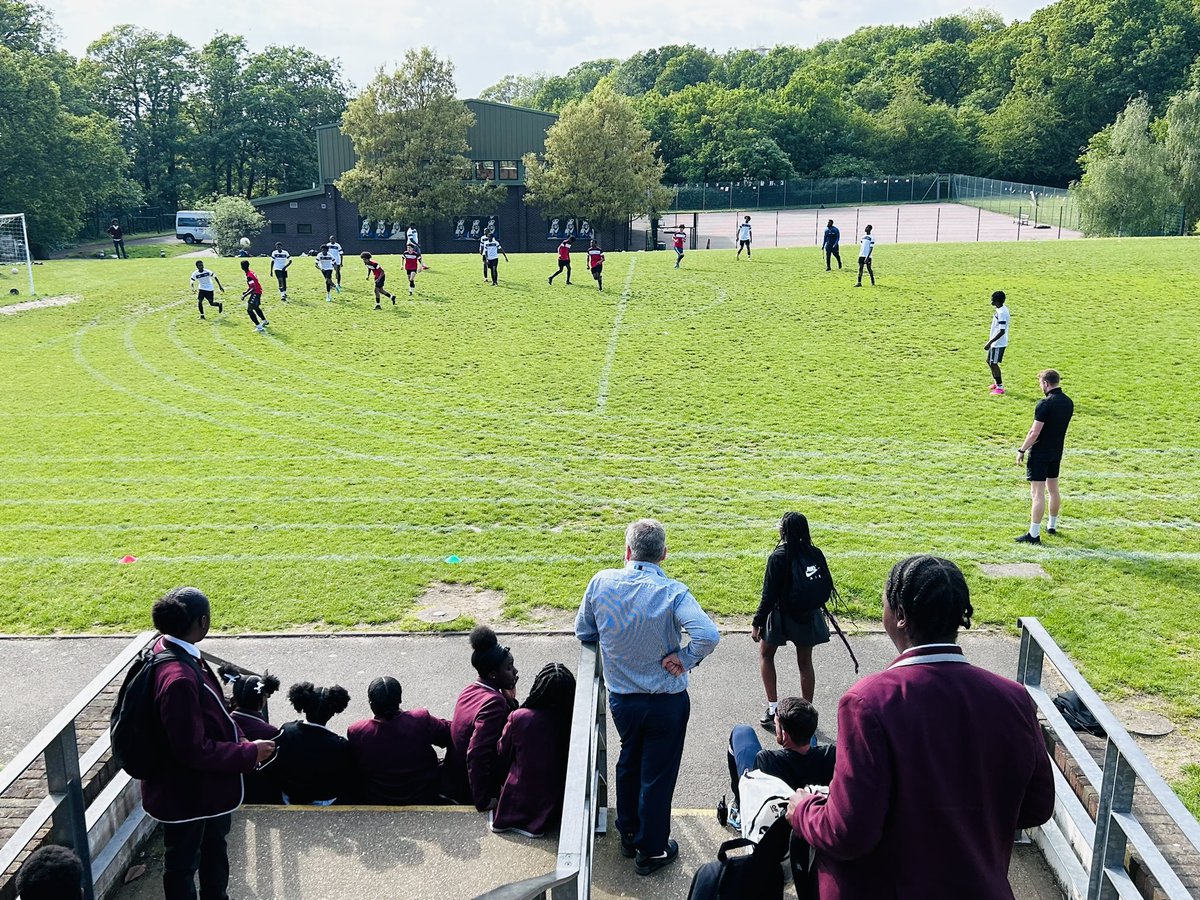SEN & Disabilities
SEN & Disabilities
Harris Academy Beulah Hill is a fully inclusive mainstream school, working towards an ethos of high quality teaching and inclusion for all. At Harris Academy Beulah Hill, all pupils are valued equally, with the academy being committed to developing ‘the best in everyone’ through an inclusive approach to education.
We adhere to the principles outlined in the Equality Act (2010) and The SEND Code of Practice, which place strong emphasis on reasonable adjustments and Early Intervention.
At Harris Academy Beulah Hill, all students are encouraged to achieve their full potential through the provision of a curriculum that is both balanced and challenging, in order to foster independent learning and develop life-long skills. Work is differentiated for students with SEND to ensure that teaching and learning is at the appropriate level for their individual needs and this is supported by Quality-First teaching.
To enable the child and young person to participate, learn and make progress, we aim to:
- remove barriers from learning
- ensure that high-quality adaptive teaching (including differentiation) is the first reaction to any possible special education need;
- put effective special education provision in place.
We believe that students achieve at their best if they feel safe, healthy, confident and happy and therefore we do our best to support all our students to develop good self-esteem and personal fulfilment.
Details can be downloaded here of our local SEN provision offer. This comprises part of the Croydon offer of provision overall. To see the SEN provision in Croydon, click here: http://www.croydon.gov.uk/education/special-educational-needs
At our school we have a Special Educational Needs Coordinator (SENDCo) who manages a team of teaching assistants. Our SENDCo oversees the assessment of the needs of our students and plans appropriate support and interventions. The SENDCo liaises with internal support teams and external professionals and ensures that recommendations and advice from all professionals is implemented and reviewed. The SENDCo, in liaison with staff, also identifies students who may be eligible for additional support throughout their education and in public exams.
The SENDCo is Charlotte Evans
Contact details:
Telephone: 020 8653 1661 email: c.evans@harrisbeulahhill.org.uk
As required by the Equality Act 2010, our school makes reasonable adjustments to ensure equal opportunity all our students. This includes provision of auxiliary aids and services.
The information in this School’s Offer is correct at the time of publication and will be subject to change.
SUPPORT & INTERVENTIONS TO SUPPORT STUDENTS WITH SEND
Provision to facilitate/support access to the curriculum/independent learning:
- Contact with Primary schools and previous schools to share information
- Sharing information at Secondary Transfer day
- Setting aspirational targets and continuous review of progress through for example – Pastoral meetings/Progress Meetings
- Regular reviews of progress which feed into Parents’ Evenings
- Engaging in LA transition process of Year 6 into 7
Access to a supportive environment:
Based on the students’ individual needs we can offer a range of resources including access to:
- Information Communication Technology
- Visual and reading aids
- Small group support where appropriate
- Referral for emotional literacy support
Strategies to support/develop Literacy (reading, writing, spelling):
We offer a range of targeted interventions that are additional to and different from our High-Quality Teaching, based on our assessment of the individual needs of our students:
- In class, small group and individual support
- Writing frames; key word lists, word banks and personalised dictionaries
- Visual aids
- Smaller groups in lower sets
- Phonics based programmes
- Literacy interventions
- Social Skills programmes
Strategies to support/develop Numeracy
We offer a range of targeted interventions that are additional to and different from our Quality First Teaching, based on assessment of the individual needs of our students:
- Specific maths programmes
- Smaller groups in lower sets
- Maths Homework Club run by staff
- Additional adult support when required
- Numeracy intervention
Strategies to support positive behaviours/social skills/emotional development:
Consistent whole school implementation of our school’s behaviour policy
- Pastoral Support Plans
- Individual support from our Pastoral Team
- Reconciliation approaches
- Referral to external professionals e.g. Educational Psychologists, Child and Adolescent Mental Health Service (CAMHS)
- Sessions with our emotional literacy specialist
Support/Supervision at unstructured times of the day including personal care:
We have a range of resources and facilities to support students at unstructured times of the day including:
- Sports clubs
- Library activities
- Lunchtime Club
- SEN games club
Access to medical interventions:
- Liaison with the medical professionals who draw up care plans for students with medical issues
- Liaison with medical professionals e.g. GPs, hospital consultants and mental health practitioners, providing on-going advice or treatment to students in the school
- Training for staff based on the specific medical needs of students as these arise
- Individual protocols for students with significant medical needs
- Implementation of risk assessments
- Key staff through the school trained in First Aid
Engagement with Parents/Carers:
Parents are welcome any time to make an appointment to meet with either the subject/form teacher or SENCo to discuss their child’s progress. We believe that a student’s education should be a partnership between parents, teachers, and the student themselves.
We therefore
- Share professional reports with parents/carers
- Identify students with a high level of need who will be provided with a personalised student profile identifying their strengths, needs and recommendations for teachers
- Communicate with parents/carers of students with EHCPs to discuss provision, support and progress
- Hold annual reviews of EHCPs to discuss provision, support and progress
- Identify students who may need addition support through various means in order to provide early intervention
Arrangements for specialist expertise from outside the school:
Our school has access to support from a range of external professionals and may source that support based on the individual needs of our students.
The school follows the graduated response: Assess, Plan, Do, Review.

Students receive support on different levels:

The SEND Code of Practice sets out four headings under which a student might be considered to have special and additional needs:
Cognition and learning
Cognition and learning difficulties cover a wide range of needs and abilities. Cognition and learning difficulties may affect all areas of the curriculum, or they may only impact on specific areas such as reading, writing, spelling and/or numeracy.
Communication and Interaction:
Communication needs cover a range of difficulties such as: producing speech sounds accurately, stammering, voice problems, such as hoarseness and loss of voice, understanding language (i.e., making sense of what people say), using language including words and sentences and interacting with others (e.g., difficulties understanding and using the non-verbal rules of good communication, using language in different ways to question, clarify or describe things, or taking into account other people’s perspectives)
Social, Emotional and Mental Health
Social, emotional and mental health (SEMH) needs are a type of special educational needs in which children and young people have difficulties in managing their emotions and behaviour. They may often show inappropriate responses and feelings to situations.
This means that they may have trouble in building and maintaining relationships with peers and adults; they may also struggle to engage with learning and to cope in the classroom without additional strategies and interventions. Children with SEMH will often feel anxious, scared and misunderstood.
Physical and sensory
Sensory impairments can be defined as an impairment that affects a child or young person’s ability to access auditory or visual information. Physical impairments usually originate from neurological or metabolic causes and can require specific intervention.
SEND support at the Academy
At the Academy, we have a range of support available to suit students’ diverse needs. The table below shows our range of interventions which take place during the school day. Some of these are open to all, most are on a referral basis.
|
Intervention |
Frequency |
Explanation |
|
Hackney Literacy Programme |
Twice per week |
Support students with low reading ages (Bedrock reading test) following the Hackney programme |
|
Numeracy |
Once per week |
Support for students identified by Maths baseline tests as having difficulties with foundational numeracy |
|
SoundsWrite Phonics |
Twice per week |
Support students with very low reading ages (Bedrock) who cannot access Hackney |
|
Sight-word Reading |
Twice per week, minimum |
Specialist support as outlined in EHCPs and recommended by an Educational Psychologist |
|
ELSA (emotional literacy) |
Each group meets once per week for a half term, 2 groups per half term |
A range of sessions from managing anxiety to rules, choices and boundaries |
|
Building Resilience |
Once per week (each group) |
Supporting students with low confidence and anxiety |
|
Study Skills |
Once per week |
Sessions to teach revision strategies and give students a space to discuss exam-related stresses |
|
Social Skills |
Once per week |
For students with social and communication challenges |
|
Speech and Language |
Once per week for each group |
Sessions delivered by a therapist to support a range of speech and language needs |
|
KS3 Homework Club |
Twice a week after school |
TA support for students to complete homework |
|
“The Junction” |
Every day |
A quiet, community space in the Learning Support Base |
We are also planning to introduce the following sessions:
- Lego Therapy
- Nessy fingers (touchtyping)
- Handwriting Club
In addition, students also benefit from:
- Pastoral support from Head of Year and/or SENCO
- Movement breaks where appropriate
- High-quality teaching strategies
- Access to fidget/sensory tools
- Coloured overlays
- Assistive technology where appropriate
- TA support in class (for students with EHCPs)
- Additional support tailored to their particular needs
What should I do if I think my child has SEND?
- Contact your child’s HOY to discuss their SEND, they will discuss what reasonable adjustments are in place and if more can be done.
- If you are still concerned contact the SENCO, Ms C Evans, with as much detail as possible. She will respond within three working days.
- Email preferred: c.evans@harrisbeulahhill.org.uk
- Phone available: 0208 683 1661 ext. 3855
- Go to the GP, especially if there is a physical need
- Contact Croydon Sensory Support if there is a suspected sensory impairment (e.g. visual or hearing)
What about SEN assessments?
- The school already has doubled its provision of Educational Psychologist time in school, but there is a waiting list
- The current CAMHS waiting list is 2+ years; this cannot be sped up by the school and it isn’t faster if we refer. GPs and other professionals can also refer, especially if they have known the student for longer
- Assessments have to be carried out by qualified clinicians- the school cannot diagnose conditions such as dyslexia, ADHD, ASD etc.
What about an Education, Health and Care Plan (EHCP)?
- This is a legal document issued by the Local Authority where the student lives
- The process takes 20 weeks from receipt of application and not all applications are successful
- They are only issued for students with the highest level of need
- The school can apply with parental consent, but parents can also apply, as can services such as CAMHS
- To evidence the application, a student will generally need to have been at the Academy for at least two full terms



















